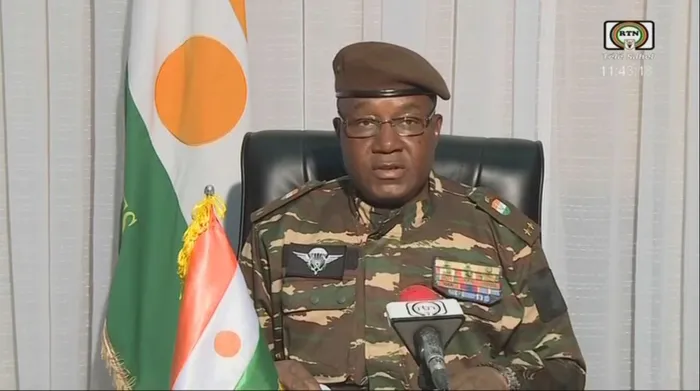African nations threaten military intervention in Niger after coup

Picture: ORTN-Télé Sahel/AFP/Obtained on July 28, 2023 – General Abdourahamane Tchiani, Niger’s new strongman, speaks on national television and reads a statement as ‘President of the National Council for the Safeguarding of the Fatherland’, after the ouster of President-elect Mohamed Bazoum.
By Leo Sands, Loveday Morris and Michael Birnbaum
A group of West African nations has threatened military intervention in Niger if ousted President Mohamed Bazoum is not returned to power by August 6, ramping up pressure on the coterie of generals who deposed the elected leader and seized power there last week.
The leaders of 11 members of ECOWAS – the Economic Community of West African States – issued a communiqué Sunday condemning Bazoum’s detention. They warned that the bloc would take “all measures necessary to restore constitutional order” in Niger, including the use of force, and ordered the defence chiefs of member nations to “meet immediately”.
The deadline came as Niger’s Western allies – including Britain, France, Germany and the European Union – all announced they were pulling aid to Niamey, Niger’s capital. Secretary of State Antony Blinken, who visited Bazoum in March and had staked high hopes on the fledgling democracy, suggested Saturday that Washington might do the same if the president is not returned to office.
Western nations had worked closely with Bazoum and his predecessor, Mahamadou Issoufou, to battle a growing insurgency in the Sahel region, where Islamist extremists have attacked security forces, overrun villages and captured swaths of territory in recent years. The United States, France and Germany all have troops deployed to Niger.
But soon after the coup plotters took power Wednesday, barricading Bazoum in the presidential palace in Niamey, the chief commander of the presidential guard, General Abdourahmane Tchiani, declared himself the new head of state. He said Friday that the “harsh reality of insecurity in Niger” had led soldiers to overthrow the president and accused the elected government of not cooperating enough with neighbouring Mali and Burkina Faso to combat insurgents.
In the capital over the weekend, thousands of pro-coup demonstrators marched through the streets, carrying signs calling on French forces to leave the country and throwing stones at the French Embassy. Niger gained independence from France in 1960.
But even as tensions flared between France and its former colony, the Biden administration said it was holding out hope that Bazoum will be restored to power.
The unrest so far has stayed quite localised, a senior State Department official said Monday, with the presidential guard surrounding Bazoum and his family in their official residence, but with life proceeding as normal elsewhere in Niamey and the rest of the country. The US Embassy remains open, and no orders have been given to pull staff or diplomats from Niger.
According to the official, who spoke on the condition of anonymity to frankly discuss the unfolding situation, the forces who overthrew Bazoum do not seem to have universal support within the Nigerien military.
“It doesn’t seem that Tchiani . . . has been able to fully build consensus among the military for his actions,” the official said, adding that the “forceful ECOWAS response” was designed to exploit the confusion and lack of planning on the part of the coup leaders.
Still, military intervention or a frontal assault on the presidential guard could lead them to kill Bazoum and his family.
“We believe the situation is really fluid,” the official said.
ECOWAS also announced a range of new sanctions placed against Niger – and member states closed their land and air borders and ordered all commercial transactions to be suspended.
In a statement Sunday, Blinken welcomed the measures but also urged all parties to find a peaceful resolution. “The legitimate, democratically elected government must be reinstated immediately,” he tweeted.
Blinken has refrained from referring to the events as a coup because US law would require an immediate suspension of aid, which could only be resumed following a democratic election. US officials say that so long as there is a short-term hope that Bazoum will return as president, Blinken will probably avoid calling what happened in Niger a coup.
But EU officials have no such qualms – and on Monday, the bloc’s foreign policy chief, Josep Borrell, issued a scathing statement denouncing the “unacceptable coup”.
Bazoum, he said, remains the sole head of state in Niger.
“The European Union supports all the measures adopted by ECOWAS in response to this coup and will support them quickly and resolutely,” Borrell said.
Sands reported from London, Morris from Berlin and Birnbaum from Washington.
This article was published on The Washington Post
Related Topics: